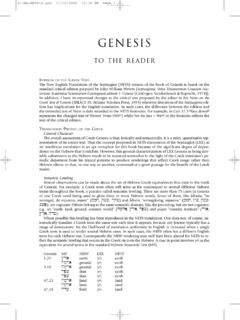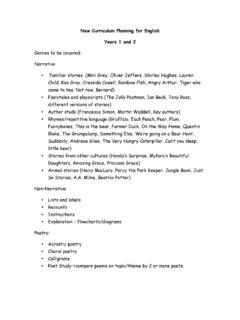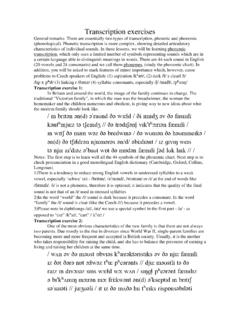Transcription of Year 4 (Entry into Year 5) 25 Hour Revision Booklet English
1 Year 4. (Entry into Year 5). 25 Hour Revision Booklet English ~1~. This page was intentionally left blank ~2~. Summary The activities for English are intended to provide scaffolding and support for pupils, developing knowledge, understanding, and skills as they progress through the booklets. While the activities are indeed labelled as 'comprehension' or 'composition' tasks, these vary significantly as they progress, and build upon knowledge and skills conveyed in earlier stages of each Booklet . All booklets have been developed in line with curriculum content from the 'Department of Education English Programme of Study for Key Stage 1 and 2 of the National Curriculum in England'. In all cases the work has been structured to build upon what has been addressed in previous sections of each Booklet , ensuring that pupils develop both skills and understanding as they progress. Where tasks have been repeated, the content has been changed to ensure on-going interest, while reinforcing knowledge and skills.
2 The initial comprehension exercises focus on developing pupils' reading skills, specifically: word reading; and comprehension. These seek to expose pupils to a wide range of writing, including: 'fiction and non-fiction to develop their knowledge of themselves and the world they live in, to establish an appreciation and love of reading, and to gain knowledge across the curriculum' (National Curriculum). Specifically pupils are made familiar with different genres: children's literature, moral tales, historical novels, American literature, political biography, fairy tale, fables, anthropomorphic writing, and nonsense stories. Reading comprehension exercises seek to increase pupils vocabulary as well as fostering creativity, imagination and a love of reading. The use of English section seeks to develop pupils writing skills, focussing in the two following skills, as set out within the national curriculum: transcription (spelling and handwriting).
3 And composition (articulating ideas and structuring them in writing). This focuses on a range of activities including: problem solving, identifying word meaning, use of new vocabulary, prefixes (dis, mis, un, re, anti, auto), identifying prefixes, planning, plot development, character development, location, introductions, use of apostrophes in contraction and possessive contexts, and active and passive voice. Composition exercises seek to build on the skills developed within the use of English , and draw on the knowledge gained within the composition exercises: Empathetic writing skills are also developed, including: life writing, dialogue and interviews, structuring prose - continuation, letter writing, biography, horror, anthropomorphic writing, descriptive writing, autobiography, and practical writing. All of these exercises are in keeping with the requirements of the National Curriculum. ~3~. Comprehension and Composition 1.
4 Learning Objective The initial comprehension exercises focus on developing pupils' reading skills, specifically: word reading; and comprehension. These seek to expose pupils to a wide range of writing, including: 'fiction and non-fiction to develop their knowledge of themselves and the world they live in, to establish an appreciation and love of reading, and to gain knowledge across the curriculum' (National Curriculum). Additional lessons are given in the identification of nouns, verbs, and adjectives, and their use in the English language. ~4~. Comprehension Task 1 Hour Once on a dark winter's day, when the yellow fog hung so thick and heavy in the streets of London that the lamps were lighted and the shop windows blazed with gas as they do at night, an odd- looking little girl sat in a cab with her father and was driven rather slowly through the big thoroughfares. She sat with her feet tucked under her, and leaned against her father, who held her in his arm, as she stared out of the window at the passing people with a peculiar old-fashioned thoughtfulness in her big eyes.
5 She was such a little girl that one did not expect to see such a look on her small face. It would have been an old look for a child of twelve, and Sara Crewe was only seven. The fact was, however, that she was always dreaming and thinking odd things and could not herself remember any time when she had not been thinking things about grown-up people and the world they belonged to. She felt as if she had lived a long, long time. At this moment she was remembering the voyage she had just made from Bombay with her father, Captain Crewe. She was thinking of the big ship, of the Lascars passing Read the extract from A Little Princess below, and answer the questions. ~5~. silently to and fro on it, of the children playing about on the hot deck, and of some young officers' wives who used to try to make her talk to them and laugh at the things she said. Principally, she was thinking of what a peculiar thing it was that at one time one was in India in the blazing sun, and then in the middle of the ocean, and then driving in a strange vehicle through strange streets where the day was as dark as the night.
6 She found this so puzzling that she moved closer to her father. Papa, she said in a low, mysterious little voice which was almost a whisper, papa.. What is it, darling? Captain Crewe answered, holding her closer and looking down into her face. What is Sara thinking of? . A Little Princess, Frances Hodgson Burnett ~6~. Read the passage above carefully and then answer the questions. Remember to write your answers in full sentences, taking care with spelling and punctuation. Questions Marks 1. What is the weather like in London? 3. 2. How old is Sara Crewe? 1. 3. Who is travelling with her? 1. 4. What does Sara Crewe look like? 3. 5. What does the word 'puzzling' mean? Look at the word in 1. the text to help you. 6. Did Sara Crewe live in India? Use words from the text to 1. support your answer. 7. Why does Sara 'move closer to her father'? 3. 8. What is Captain Crewe like as a person? Look at the way 4. he speaks to Sara.
7 9. 'What is Sara thinking of?' Write down what Sara must be 8. thinking and feeling. Use your imagination to help you. Total 25 marks Write your answers in the space below: ~7~. ~8~. ~9~. ~10~. ~11~. ~12~. Use of English Spelling 1 hour Look at the following sentences. In each sentence one word is scrambled. Unscramble the word and write it in its correct form in the space provided. In each case the first letter is in the correct place. Ex. I don't want to go to bed now, it's too elray. early 1. I didn't eat the whole cake I only ate one. qteruar. 2. The eahtr is the third planet from the sun. 3. Tomorrow is my birthday; I will be ehtig years old. 4. I like to cycle; I ride my bciycle everywhere. 5. Everyone knows that actor; he's very fmousa. 6. The month after January is called Fberuray. 7. I like to stay healthy by eating lots of furit and vegetables. 8. I want to biuld a sandcastle on the beach. 9. My teacher gave me an answer to my qeustoin.
8 10. In science we do exepirmnets ~13~. Now use these ten unscrambled words to make sentences of your own. Make sure you are spelling every word correctly. Check words in a dictionary if you are unsure. 1. 2. 3. 4. 5. ~14~. 6. 7. 8. 9. 10. ~15~. Look at the following words taken from 'A Little Princess' and select their correct meaning from the list of options. Circle the correct option. Key: (n) = noun (v) = verb (adj) = adjective 1. Voyage (n). a) An old person b) A long trip by the sea c) A planet 2. Peculiar (adj). a) Strange b) Tall c) Pretty 3. Fog (n). a) A storm b) A thick cloud c) A fire 4. Vehicle (n). a) A type of drink b) An old shoe c) A thing used for transport ~16~. Check your answers in a dictionary. Now write four sentences that include these four new words. 1. 2. 3. 4. ~17~. Task: Choose eight of the words you have just learnt how to spell and include them in a short story. The title of this story is 'Moving House'.
9 Write between 150 and 200 words. Write your answer on the lines below. ~18~. ~19~. Composition Task 1 Hour Sara Crewe is being sent to a girls' boarding school in London. She will no longer be able to live with her father but will instead be living with the other girls at the school. Imagine you are Sara Crewe on the day that your father has said goodbye and left you at your new school. First, write down your thoughts and feelings as bullet points in the space below. ~20~. Now write down notes about the good points and bad points of going to a boarding school. ~21~. Now, writing as Sara Crewe, give a full account of your first day at the new school. Try to include some of the new spellings you learnt in the 'Use of English ' section. 25 marks are available for each answer and an additional 10 marks for the quality of vocabulary, syntax, spelling and punctuation. ~22~. ~23~. Comprehension and Composition 2. Learning Objective Building on previous lessons, pupils are asked to practice their comprehension and composition skills in an engaging way, and in different formats.
10 Additional lessons are given in the identification and use of common prefixes in the English language. ~24~. Comprehension Task 1 Hour Read the extract from The Happy Prince below, and answer the questions. High above the city, on a tall column, stood the statue of the Happy Prince. He was gilded all over with thin leaves of fine gold, for eyes he had two bright sapphires, and a large red ruby glowed on his sword-hilt. He was very much admired indeed. He is as beautiful as a weathercock, remarked one of the Town Councillors who wished to gain a reputation for having artistic tastes; only not quite so useful, he added, fearing lest people should think him unpractical, which he really was not. Why can t you be like the Happy Prince? asked a sensible mother of her little boy who was crying for the moon. The Happy Prince never dreams of crying for anything.. I am glad there is someone in the world who is quite happy, muttered a disappointed man as he gazed at the wonderful statue.









